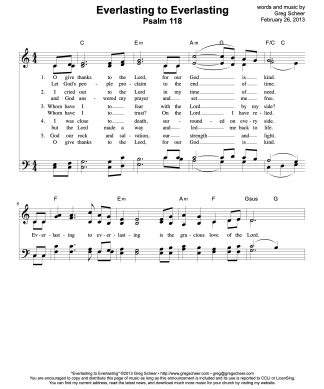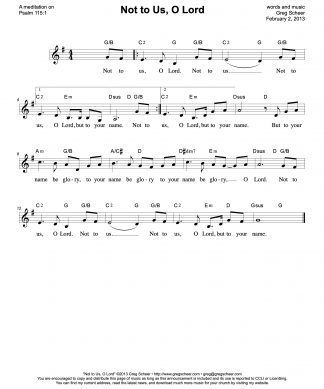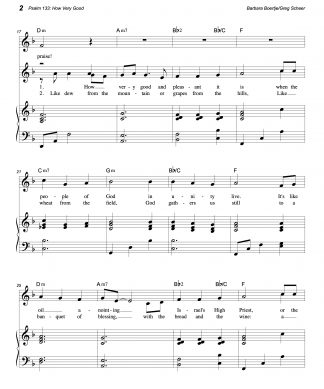
SYNOPSIS: This episode is a recording of a chapel service that Greg led at Calvin University, looking at the themes of Psalm 123 and God’s mercy.
RESOURCES MENTIONED IN THIS EPISODE:
- Video: Psalm 123 and the God of Mercy, Calvin University Chapel 2/1/22, Rachit Kharel, dancer
- Song by Greg: Psalm 123: Have Mercy
- Other Songs: There’s a Wideness in God’s Mercy by Gregg DeMey; His Mercy Is More by Matt Papa and Matt Boswell
TRANSCRIPT
Welcome to the Greg Scheer Music Podcast. Today we’re going to do something a little bit different. I’m going to play you a recording of a service that I led this week.
So, I led a service in the Calvin University Chapel, and that was part of the Calvin Worship Symposium. I led it on Tuesday, which was February 1st, 2022. And I thought I would just let you hear the talk. The talk is centered around Psalm 123 and God’s mercy. And there is also a video online of this, and the url will be in the notes below the podcast. And I would encourage you to watch the video, in part because the first song is my setting of Psalm 123. There is a beautiful dance to it. Rachit Kharel did a dance to it while people listened to it being played over the speakers, and it’s well worth the time of watching.
Now, in this podcast, because the sound wasn’t great live for that song, I spliced in the song from a recording, and you can listen to that, and then the talk starts after that.
The talk starts looking at Psalm 123, and sees this Psalm as a Psalm of being seen. After that, the congregation, I led the congregation in singing just the chorus of that song. And Psalm 123 is also a Psalm of mercy, so I talked a little bit about God’s mercy. And then we end the chapel with some more singing.
So, without further ado, listen to Psalm 123 and the God of Mercy in the Calvin University Chapel on February 1st, 2022.
Have mercy. Have mercy Lord.
Have mercy. Have mercy Lord.
Our eyes look to you.
Our eyes look to heaven.
Our eyes look to you
until you show your mercy, God.
Cast your eyes on us.
Cast your eyes on earth.
Cast aside the proud
who bind us with no mercy, God.
That song was based on Psalm 123. It’s something that I wrote a couple years ago, and we’re going to use that as a way in to look at Psalm 123 and God’s mercy. So, if we can have those words up.
So, side by side this is Psalm 123 and then my setting of Psalm 123. When you write a song based on a Psalm, you need to kind of dig into the Psalm and see what it is at its core. And this Psalm, I see it as a Psalm of being seen. So look at all the seeing words that are being used in that Psalm: “I lift up my eyes, I lift up my eyes to the heavens.” The first part of it is all about lifting up the eyes to the heavens. Of course, the servant-master language is troubling for us as modern readers, but it still gives that sense of dependence, looking up in dependence.
And then the second part is God looking down to us, God looking down in mercy. We’re basically praying for God’s mercy. And this is where I see this Psalm as being seen. And, you hear this word a lot— we want to be seen, we want to be known as we really are, and we often think of Jesus, I think, as someone who sees us, but not sees us in the way we want to be seen.
I think we see Jesus as the ultimate Santa. He knows when you’re sleeping; he knows when you’re awake. He knows when you’ve been bad or good, so be good for heaven’s sake. He’s just like, “I’m watching you.” But that’s not the way it is. The way it is is more like this, where we are being seen by God. It’s more like a parent who thinks that a child is just the most beautiful, smartest thing in the whole world, and because of that love, because of that sense of being known to the core of your being and being accepted, then you’re able to live into that love.
I want you to just keep looking at this for a second. We’re going to sing the chorus of that song. But I want you to just ask the Spirit to reveal something in these words, either the Psalm or the song, something that speaks to you. And then we’re going to pray that.
Just find that image in your mind. What is the Spirit saying to you?
Have mercy. Have mercy, Lord.
Have mercy. Have mercy, Lord. . .
This idea of mercy is also in this Psalm. And it’s one that I’ve been thinking a lot about as I have thought about, about meeting here. I think “mercy” is a word like “grace.” It has lost its power over time, right? If someone says to you, “What is grace?” What do you say? You say, “Unmerited favor,” right, because that’s what you’ve learned in Sunday School. But after a while, these words, they become associated with other things. For example, you say grace before a meal, and that kind of muddies the waters. Same thing with mercy, and you have to. . . I was thinking about, how do I reclaim this word? How do I reclaim this idea of mercy to some of the impact that it really has.
And as I was thinking about this, the first thing that came to mind, and this is kind of a silly illustration. Did any of you play Mercy when you were a kid? Some people call it Uncle. All right, so this is like the schoolyard thing, where, you know, young boys try to prove how tough they are. You grab each other’s hands, lock hands, and then go, right? It’s almost like arm wrestling, and you push, push, push, push, push. And if you start to overpower the other person enough so that it starts to hurt them, and of course boys are not going to give up very easily and not want to lose face. But at the very point that you feel you’re about to have your fingers broken, you say, “Mercy!” Right? And that’s the image that came to mind, and it’s helpful in the sense that this is the idea of mercy of relent. We’re saying, “Relent. Stop. I’m at your power. I’m at your mercy.” Right? Like, that’s the figure of speech closest to it. You say, “I’m at your mercy.”
And so there’s that sense of powerlessness, and being beholden. And many humans, we don’t like to be beholden to anything. Right, but we are beholden to lots of things. We are beholden to parents, we are beholden to disease, to addiction, to oppression. All of these things like this have power over us. And I think the beauty of Psalm 123, is that it says that there’s this ultimate power, and that’s who we appeal to for mercy.
As I continued to think about mercy, and I was trying to tease this out, suddenly a phrase came to my mind, that mercy is the anti-karma. So you know this idea of karma, right? That what goes around comes around. And I’m sure that Buddhist would have a more fuller, a fuller definition of what karma is. Right, “you’re going to get yours,” right? “Karma’s going to get you.” And there’s that idea of accusation. And the reason that we have this, I think, is because we have this innate sense that we deserve something bad, right? I was thinking about all of the kinds of phrases that we use. “Karma will catch up with you. You’ll get yours.” I was even thinking of the Nine Inch Nails song: “Bow down before what you serve. You’re gonna get what you deserve.” He’s got that really strong sense throughout that whole album. Trent Reznor has that really strong sense that he needs to pay for something.
And I think that humans have that inside them. We feel that we need to pay for something. And the idea of mercy is the anti-karma. It lifts that and says, “No, you don’t have to pay for that. Jesus has paid for that.” That you can appeal to God for mercy, and that your own personal sins, the oppressions of the world, will all eventually bow down to God, so that we are released from what we need to pay for that.It’s a really profound thing. Once again, it’s so easy to fall back to the Sunday School definitions of this, but it’s such a powerful thing and I would encourage you to contemplate on that.
Just like grace, we can remind ourselves that there’s no way that we can earn this. This is something that God does, and not something that we earn. Once again, in the same way that we have this internal sense of retribution, that we need to pay for our sins, we also have this sense that we need to earn love. Right, that God just can’t love us just because he has great affection for us. No, we have to earn it in some way.
So if we can’t earn it, what can we do? What is the proper response to mercy? It seems to me that there are three responses. The first, is simply a reflex of joy and thanksgiving. This idea of relief, of just exhaling, and saying, “I am at God’s mercy, and that’s a good mercy.” And just being so thankful for that. And anything that we do, when we respond to God we respond in thanksgiving.
The next thing that we can do is we can live up to that mercy. So if you think about, you know, all the classic movies where the no good person that is still somewhat loveable, you know, does something wrong and then the judge lets him off at the last minute. Now, there are two ways that this can happen when you find that mercy, when you find that you’ve been disentangled from paying for your sins. There are two ways that you can deal with this. The one is you can say, “Phew, I got away, now I can do something even worse and hope for the best.” And that’s the kind of scoundrel version of this.
But what we hope we’ll do is that when that person lets you off, when God lets you off and says, “I’m going to show you mercy because of my deep affection for you, because I know you’re better than that,” that the thing that we do is we live into that, we live up to that. That God says, “I’m not going to make you pay for this. Instead I want you to just be who you really are. I see you, and I love you as you are, and I know that you can live into this.” It’s a beautiful thing that that’s our response to kind of getting off the hook, is not just getting off the hook, but saying, “Well, what would a better person do? How can I respond in a better way?”
And then the third thing that seems to me is a response to mercy is that we pay it forward. It seems to me that Christianity in general is a pay-it-forward religion. There’s nothing we can do, right? So, I mean, we can give our praise back to God, but there’s nothing we can do to earn, to pay it back, anything like that. And I think that what God is always looking for us to do is to mimic what he’s done, and to go out and be merciful. So we think about in the New Testament the ungrateful servant who is shown mercy, the debt is paid, and then goes out and throttles someone that’s under them to get some money out of him. That’s the bad example. So, the paying forward of it is to have mercy to those around you, to see the best in people, and give them the chance that they need to live into that. And that seems to me what we really need to think about as we think about mercy.
We are going to respond with singing, which is a way of having joy and thanksgiving. Let’s stand together and we’re going to sing a couple songs.
There’s a wideness in God’s mercy
like the wideness of the sea.
There’s a kindness in God’s justice
which is more than liberty.
There is no place where earth’s sorrows
are more felt than up in heaven.
There is no place where earth’s failings
have such kindly judgment given.
For the love of God is broader
than the measures of the mind,
and the heart of the eternal
is most wonderfully kind.
Make our love, O God, more faithful.
Let us take you at your word,
and our lives will be thanksgiving
for the goodness of the Lord.
Praise the Lord! His mercy is more;
stronger than darkness, new every morn.
Our sins, they are many; his mercy is more.
For copyright reasons I need to fade out at this point. You may recognize this song as “His Mercy Is More.” It’s a great song by Matt Boswell and Matt Papa. Before that we heard “There’s a Wideness in God’s Mercy” by Gregg DeMey. Gregg is a friend, and I think he would be okay with me playing this song on my podcast. So that’s a beautiful new melody written for the old words of “There’s a Wideness in God’s Mercy.” Information on both of those songs will be in the information on the podcast below.
So thanks so much for being with me today. Once again this is the Greg Scheer Music Podcast, and I look forward to being with you again soon.




